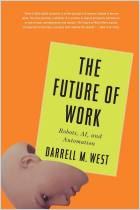Join getAbstract to access the summary!

Join getAbstract to access the summary!
Scott Santens and Steve Clemons
Income Without Work
The Future of Work Summit
The Atlantic, 2016
What's inside?
A universal basic income can ensure that all people thrive when machines eliminate work.
Recommendation
In June 2016, the Swiss rejected a proposal to be the first nation to introduce a universal basic income, an idea that received little public or political support. But at a time when machines are vanquishing human labor, the introduction of a universal basic income may eventually prove necessary, and microexperiments in basic income are cropping up globally. In conversation with journalist Steve Clemons, writer Scott Santens describes his personal pursuit of a basic income and discusses ways to scale the model. While Santens’s findings may disturb those who recoil at the idea of socialism, getAbstract applauds his innovative approach to investigating solutions to a pending problem.
Summary
About the Speakers
Writer Scott Santens advocates for a universal basic income. Steve Clemons is an editor at large for The Atlantic.























Comment on this summary